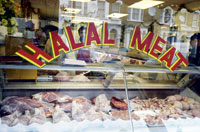Meat industry defends halal slaughter policy

Significant quantities of the meat sold in the UK on the open market are slaughtered under halal standards, it has emerged.
Industry estimates suggest strong Muslim demand for chicken and lamb has resulted in about 40% of poultry and 25-30% of lamb consumed in the UK meeting halal specification.
But not all of this meat is being marked as being produced using halal slaughter methods.
Animal welfare campaign groups are suggesting that consumers need to be made aware if they are eating halal meat through clear labelling. They claim that the practice is cruel because in some cases the animals are killed without stunning.
But representatives of the meat industry have pointed out that in the UK most animals are pre-stunned before the animal’s throat is cut.
Historic data published by the Meat Hygiene Service suggests that around 90% of UK halal slaughter involves pre-stunning.
Beef and Lamb New Zealand confirmed that while the majority of the beef and lamb imported to the UK is slaughtered using halal methods, it is all pre-stunned.
Dave Harrison, regional manager for Europe for Beef and Lamb New Zealand, said all animals were pre-stunned before slaughter, although the stunning process was reversible in order to comply with religious custom.
“The [method] we use is acknowledged. We believe it balances animal welfare requirements with religious needs.”
Mr Harrison said he understood that animal welfare was an important issue to consumers, but if labelling was introduced it would come with a cost.
“We are not just talking a sticker – you also then need a verification system. The minute you call for a label you put cost in the system. That means either producers are paid less or buyers pay more.”
The RSPCA said that it was proposing all meat produced from animals that had not been stunned before slaughter should be clearly labelled. “The RSPCA believes that consumers have the right to choose whether or not they wish to buy meat from animals slaughtered without pre-stunning.”
A spokeswoman from EBLEX said the levy body had set up a Halal Steering Group which has been researching halal production methods and whether there are market opportunities for farmers. The research would be published shortly.
